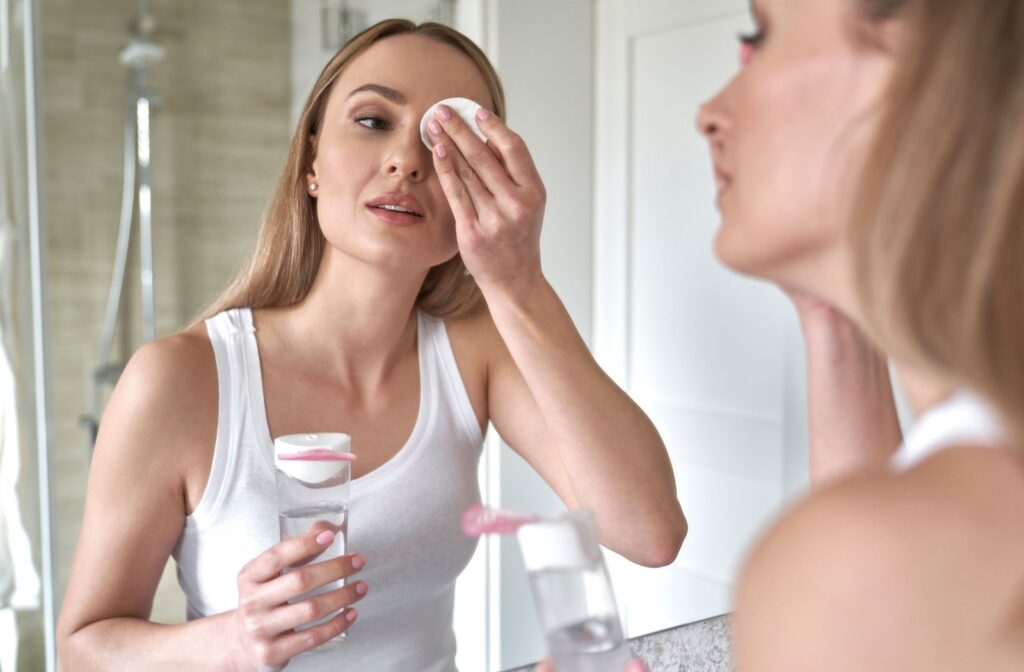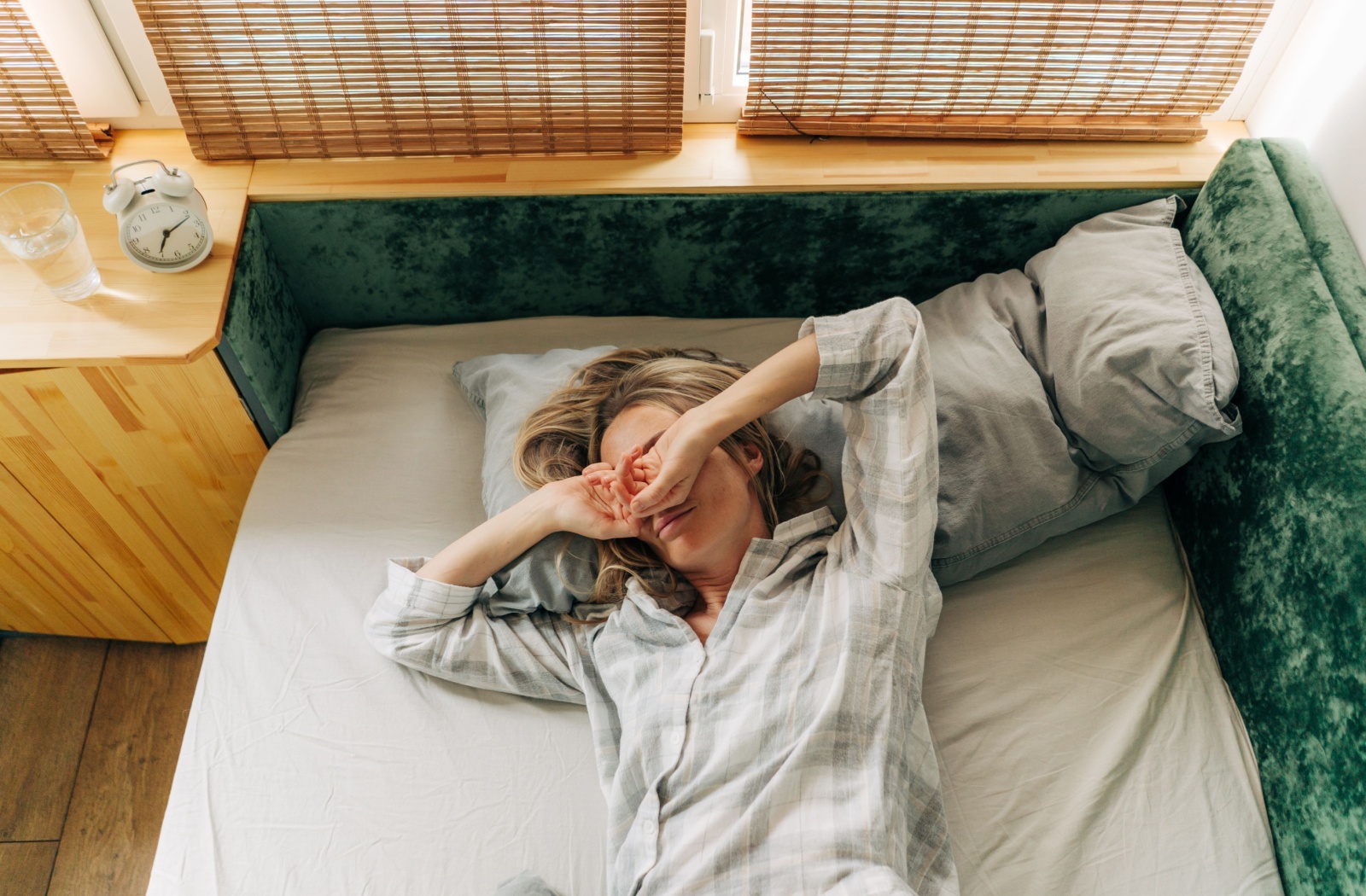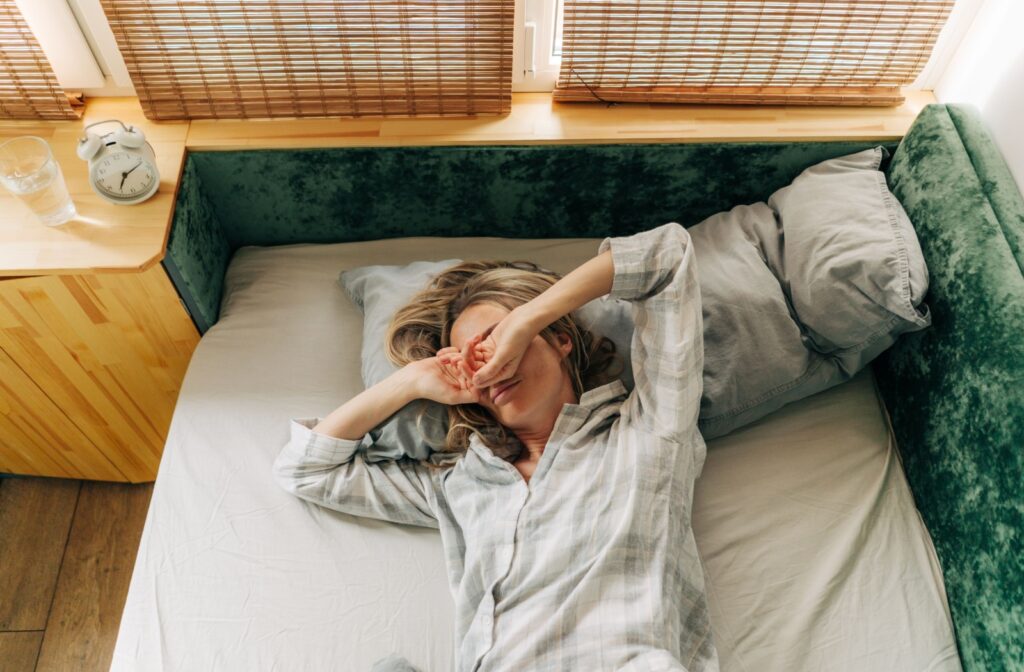Waking up should feel refreshing, but for many, it comes with an uncomfortable feeling of dry eyes. This irritation can disrupt your morning, sometimes even leading to intermittently blurry vision, and affect how well you sleep.
Several factors, from your sleep habits to the environment in your bedroom, can contribute to waking up with dry eyes. Understanding these reasons is the first step toward finding comfort and starting your day with clear, comfortable vision.
What Is Dry Eye?
Dry eye is a common condition that happens when your tears can’t provide enough lubrication for your eyes. This issue can come from two main problems. Either your eyes don’t produce enough tears, or the tears you do produce are of poor quality and evaporate too quickly.
A healthy tear film has a precise balance of water, oil, and mucus that coats and protects your eye’s surface. When this balance is off, your eyes can feel scratchy and irritated. This feeling is often more noticeable in the morning.
Common Reasons for Morning Dry Eye
Several factors can lead to dry eye, especially overnight. When you sleep, you aren’t blinking, which is the natural way your eyes spread fresh tears across their surface. This lack of blinking can make certain underlying issues more apparent when you wake up.
Eyelids That Don’t Fully Close
A condition called nocturnal lagophthalmos occurs when your eyelids don’t close completely during sleep. You may not even be aware it’s happening. Even a tiny gap is enough to expose the surface of your eye to the air all night long.
This constant exposure causes your tears to evaporate, resulting in significant dryness, redness, and irritation upon waking. It can leave your eyes feeling like there’s sand in them.
Tear Quality and Quantity
Your tears need a healthy oil layer to prevent them from evaporating too quickly. Tiny glands that line your eyelids produce this oil. If these glands become blocked, your tears will lack the oil they need, causing them to dry up too fast. Our clinic offers specific dry eye therapy to address these issues.
In other cases, your eyes may simply not produce a sufficient volume of tears to keep them moist, especially over a long period like a night’s sleep. This can be related to age, hormonal changes, or other factors.
Your Sleep Environment
The air in your bedroom can play a large role in how your eyes feel in the morning. A fan, air conditioner, or forced-air heater can reduce the humidity in the room. Dry air pulls moisture from any available source, including the surface of your eyes.
Allergies and Irritants
Your bedroom can contain allergens like dust mites, pet dander, or even mould spores that you can’t see. These particles can trigger an allergic reaction, causing eye irritation and dryness, with symptoms that can sometimes be mistaken for other conditions, like pink eye. Some skincare products or makeup removers used before bed can also irritate the delicate skin around your eyes and affect your tear film.
Other Contributing Factors
Sometimes, dry eye is related to other things. Certain medications, both prescription and over-the-counter, can list dry eye as a side effect. It can also be associated with some general health conditions, so it’s always useful to consider your overall health.
How to Relieve Dry Eye at Home
You can try several simple strategies at home to find relief from morning dry eye. These methods can help manage symptoms and improve your eye comfort. A consistent routine can make a noticeable difference.
Use a Bruder Mask
Applying a heated Bruder mask over your closed eyelids for a few minutes can provide effective relief. The consistent warmth helps to soften and unclog the oil glands along your eyelids. This can improve the quality of your tears, allowing them to lubricate your eyes more effectively.
Wash Your Eyelids
Keeping your eyelids clean can help reduce inflammation that may contribute to dry eye. You can gently wash the base of your eyelashes with warm water and a very mild cleanser, like diluted baby shampoo. This helps remove debris and bacteria that can clog your oil glands.

Make Lifestyle Adjustments
- Stay hydrated by drinking plenty of water throughout the day, which helps support healthy tear production.
- Use a humidifier in your bedroom at night to add moisture back into the air.
- Consider installing an air filter in your room to reduce airborne irritants, such as dust and pet dander.
Follow the 20-20-20 Rule
If you use digital screens frequently, your blink rate can decrease, leading to eye strain and dryness. Take regular breaks using the 20-20-20 rule. Every 20 minutes, look at something 20 feet away for at least 20 seconds to give your eyes a rest.
Professional Treatments for Dry Eye
If home remedies don’t provide enough relief, an eye doctor can suggest other options. We can recommend a plan based on the specific cause of your dry eye. There are many effective ways to manage this condition and prevent related issues, such as headaches caused by dry eye.
- Specialized drops and ointments: We might suggest specific over-the-counter drops or prescribe medicated drops. These can help reduce inflammation or stimulate your eyes to produce more of their own tears.
- Slow tear drainage: This is a simple procedure where tiny plugs are inserted into your tear ducts. This slows down tear drainage, much like putting a stopper in a sink, to keep your eyes more moist.
- Clear blocked glands: A device can be used to apply gentle warmth and pressure to the eyelids. This helps clear blockages in the oil glands, which can improve the quality of your tears.
- Therapeutic contact lenses: In some cases, special lenses can be worn to protect the surface of your eye. These lenses act like a bandage, trapping moisture to relieve discomfort and help the eye heal.
When to See an Eye Doctor for Dry Eye
If you continue to wake up with dry eyes despite trying home remedies, an eye exam can help identify the root cause. A professional can assess your tear production and quality to determine a suitable approach for your situation. You don’t have to just live with the discomfort.A comprehensive eye exam is a positive step toward finding long-term comfort. Our team at Insight Eyecare is ready to discuss your symptoms and develop a personalized plan. Call us today to book your appointment.







